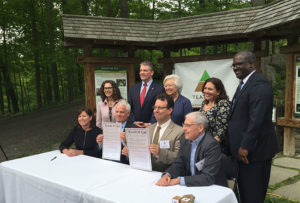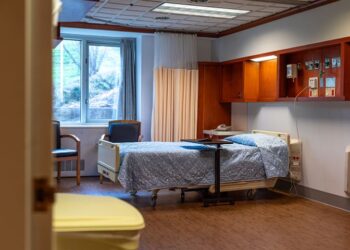Whether as a “partner,” “big brother” or “incubator,” the Brooklyn Botanic Garden was essential to the creation of northern Westchester’s Teatown Lake Reservation Nature Preserve, today the largest privately owned preserve in Westchester County.
Those were all terms used by officials from both organizations in a ceremony May 18. Leaders of the Botanic Garden and Teatown gathered on a sunny Friday afternoon to celebrate the history of that relationship ”“ and its legal end.
Almost 40 years ago, Brooklyn Botanic Garden helped launch Teatown and has held about 245 acres of land within the preserve for more than a half-century. Seated at a table within part of Brooklyn Botanic”™s Teatown land, botanic garden officials signed off on paperwork to deed that land to the Teatown organization.

Kevin Carter, the executive director of Teatown, said that without the Brooklyn Botanic Garden, the organization he now runs wouldn”™t exist. Although the preserve now encompasses about 1,000 acres, the land held by the botanic garden is described as Teatown’s heart. It holds Teatown”™s offices, education center, museum and the lake itself.
“Today”™s transfer of title in many ways is the capstone in this unique, nearly six-decade relationship,” Carter said.
The title transfer also ensures the property will be protected from development through a conservation easement held by the Brooklyn Botanic Garden.
How a botanical garden in Brooklyn wound up holding 245 acres of mostly wooded land in Westchester County is a story that dates back to 1923. That”™s when Gerard Swope Sr., the chairman of General Electric, purchased the estate in Yorktown, known at the time as “The Croft.” He and his family built a network of horse trails there that today guide hikers along the property. A year after his purchase, he dammed a brook running through the property and flooded a low-lying meadow, creating the 42-acre body of water known as Teatown Lake.
Swope died in 1957 and left the property to his children, who wanted to see it preserved. The Swopes were introduced to representatives of the Brooklyn Botanic Garden, which operated a research station nearby at Kitchawan Preserve. The two sides came to an agreement in 1963: The Swopes signed over the land, and in exchange, the Brooklyn Botanic Garden promised to preserve it and launch educational programming.
Eight years later, Teatown was officially established as an independent nature preserve with a board of 21 community members. By 1980, Teatown started operating independent of Brooklyn Botanic Garden and signed a 99-year lease for the property. Geoff Thompson, a former board chair of Teatown, said Teatown offered a symbolic jug of maple syrup as part of the lease agreement.
Teatown has since acquired or been managing more than 800 additional acres across Yorktown, Cortlandt and New Castle. The preserve hosts 15 miles of trails that attracted 10,000 visitors last year and offers educational programs it estimates reach 20,000 adults and children each year.
Carter highlighted those educational programs as the most important aspect of Teatown”™s work, which he said is now protected through the conservation easement.
“Education is what we do, it”™s our lifeblood,” Carter said. “The foundational idea that when someone is outdoors and connects with nature, they develop that empathy, they develop the feeling of wanting to care for something.”
As if to prove the point, a couple of young hikers wandered behind the podium as he spoke, fresh off a hike around the Teatown”™s Lakeside Loop.
A number of factors drove Brooklyn Botanic Garden to hand off the land. First, the garden itself decided in the 1980s to focus on its Brooklyn campus and programs. This land was the last of its presence in Westchester.
But more than that, Brooklyn Botanic Garden President Scot Medbury said Teatown”™s success made the botanic garden confident the organization could carry out the Swope”™s vision on its own.
“When we leased the land, Teatown was young enough that we weren”™t really sure how strong they would become,” Medbury told the Business Journal following the event. “We”™ve watched them grow into more than 1,000 acres and seen the breadth of their programs”¦ I”™ve watched them just get stronger and stronger. So we thought, why not just give to them? We have every confidence they”™ll do the right thing by it.”
Even without the land, Medbury said the two organizations will remain partners. He serves on an advisory board for Teatown and said the two organizations can work together on advocating for living museums and in developing educational programming.
The process to actually hand over the land required negotiations on and off for more than a decade. Nancy Felcher, vice chair of Teatown”™s board, joked that while all Teatown officials were happy to receive 245 acres of land, she was also glad to be rid of “245 tons of documents off my desk.”
“This is not a gift for us, of course,” she added, “but for all the people who follow.”




















